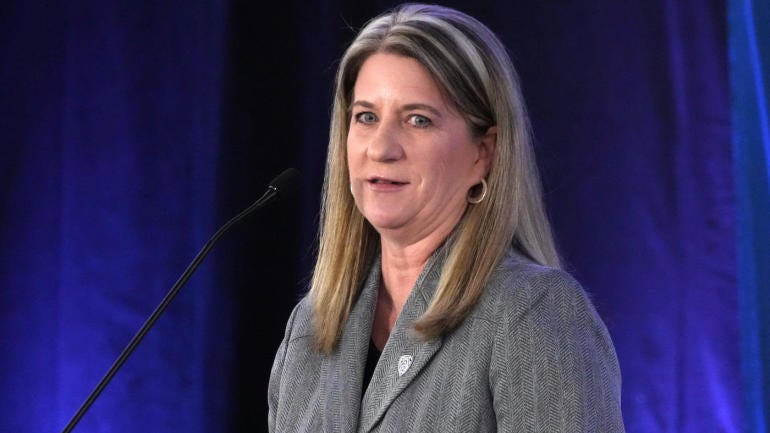
New Pac-12 commissioner Teresa Gould faces an uphill climb. With the Pac-12 fighting for survival and moving on from ex-commissioner George Kliavkoff, the College Football Playoff reworked its format from a "6+6" model to a "5+7" model that takes away one automatic bid from the 12-team field for an extra at-large spot. That puts Oregon State and Washington State, the Pac-12's remaining members, in a fragile spot.
Speaking with the media for the first time since taking over earlier in February, Gould addressed some of the more immediate challenges as she steps into a conference that, for the next two years, will have to fight for its very existence.
College Football Playoff access sits right at the top of Gould's docket in big, bold letters. Since Oregon State and Washington State, the remaining schools making up the nominal "Pac-2," cannot compete for a conference championship, they have to battle it out for an "at-large" spot to even have a hope at making the playoff. Gould didn't understate the importance of ensuring that the Pac-12 is represented in the CFP discussion based on its on-field merits and maintaining fair share of revenue distribution under the current playoff contract.
"Our job collectively as the leadership of the College Football Playoff is to make sure whatever plan it is, that we have a plan that is adaptable and nimble to the changing times we're in," Gould said.
More change could be on the horizon, however. There is already momentum for further expansion, with 14- and 16-team formats leading discussions. The SEC and Big Ten are said to be pushing for three conference-exclusive auto-bids each in a potential 14-team playoff, which would limit opportunities for conferences that may not have as much of a say in the current power structure.
Gould isn't necessarily opposed to further expansion, though there are some qualifiers.
"To me there is magic between 12 or 14 or 16," Gould said. "As you can imagine the devil is in the details, the format, the schedule. We need to continue to make sure we're protecting the student-athletes' academic commitments, that we're talking about impact on the bowl system ... In my opinion, we have a very healthy college football product that has more depth and more parity than we've ever had. I think if the economics and other considerations support a larger field it's something we have to make sure we talk about."
Whatever the format, Gould pushed for Oregon State and Washington State to have "reasonable access based on what they competitively earn on the field."
Before anything else, Gould has to secure a future for the two schools over which she currently presides. The Pac-12 essentially has a two-year grace period before its status as a conference dissolves. Gould's contract with the conference coincides with that window.
The Pac-12 has a scheduling alliance with the Mountain West in place for 2024, with an option to continue during the 2025 season, so Washington State and Oregon State can fill out a 12-game slate. The Beavers and Cougars are not eligible for the Mountain West Championship Game; it's a temporary solution as the Pac-12 explores other possibilities.
Mergers have not been an unfamiliar idea between the Mountain West and Pac-12 in the past. No matter the route, though, it will be a challenge for the Pac-12 to maintain that autonomy status as the balance of power shifts.
"We have programs on these two campuses that compete at the highest level," Gould said. "I wanted to be the leader that fought on behalf of those student athletes and their future."
















